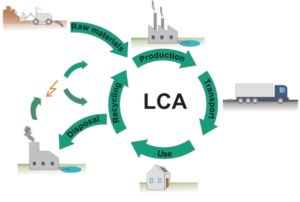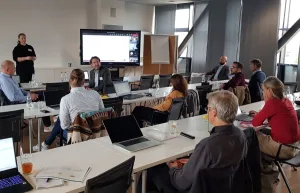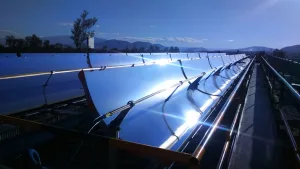Life cycle assessment for solar thermal systems
October 28, 2022
The IEA Solar Heating and Cooling Programme will start a cross-sectoral research group on life cycle and cost assessment (LCA). The objective is to develop guidelines on methodology and to define the parameters for location and system-specific economic and ecological assessment. The IEA SHC executive committee has commissioned the German scientist Karl-Anders Weiß from the Fraunhofer ISE to lead the task-definition phase (see photo). Weiß plans to hold the next online workshop to discuss the workplan and the distribution of responsibilities on 8 November 2 to 3:30 pm CEST. For more information, please send an e-mail to karl-anders.weiss@ise.fraunhofer.de.
Photo: Fraunhofer ISE
Weiß sees life cycle and cost assessment as important tools for evaluating existing products as well as to accompany product development. He wants to include cost assessment as well as social aspects in the analysis. Weiß heads the unit Business Developer Service Life & Sustainability at Fraunhofer ISE. He has been involved in life cycle analysis for more than 10 years at the German research centre ISE.
Improve and complement existing methodologies
“Life cycle assessment is cross-sectoral by nature,” emphasised Weiß. That is why the workplan includes a subgroup that is responsible for cooperation with other heating and cooling-related tasks within the IEA Technology Collaboration Programme.

Collaboration with other IEA TCPs
The results of Task 12 within the IEA Photovoltaic Power Systems Programme (PVPS) are particularly relevant. They include methodology guidelines on LCA of photovoltaics and life cycle inventories from the year 2020. Find all reports from Task 12 online: https://iea-pvps.org/research-tasks/pv-sustainability/
Another relevant research group just closed within the IEA Energy in Buildings and Communities Programme (EBC). Under the title Annex 72 – assessing life-cycle-related environmental impacts caused by buildings, researchers established methods for the development of specific environmental benchmarks for different types of building. The final report is expected in spring 2023 titled Context-specific assessment methods for life cycle related environment impacts caused by buildings.
“We will check existing methodology and data to improve and complement it in close cooperation with our colleagues from Task 12 and Annex 72”, said Weiß. He plans to organise a workshop with PVPS and EBC representatives on common understanding and approaches regarding ecological footprint assessment. The next task definition meeting within IEA SHC will be about seeing who can do what and who gets in touch with whom within the IEA programmes.
Organisations mentioned in this news article:
https://www.iea-shc.org/
https://iea-pvps.org/
https://www.iea-ebc.org/
https://www.ise.fraunhofer.de/en.html



